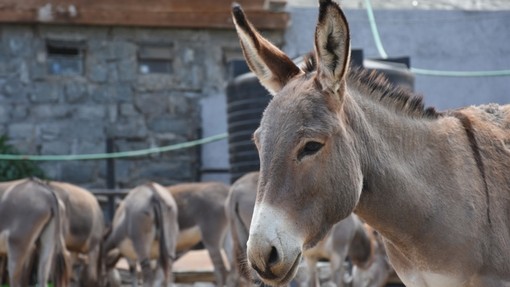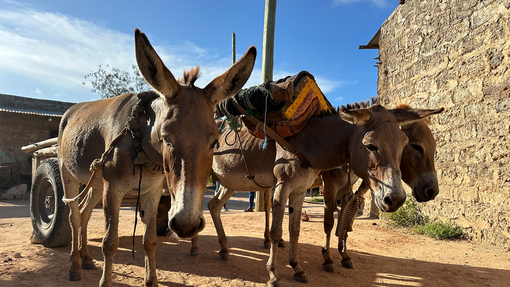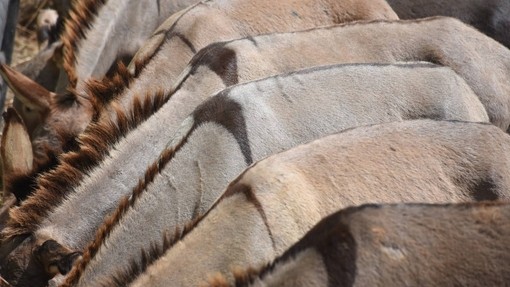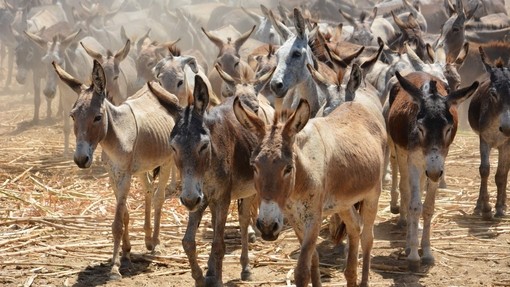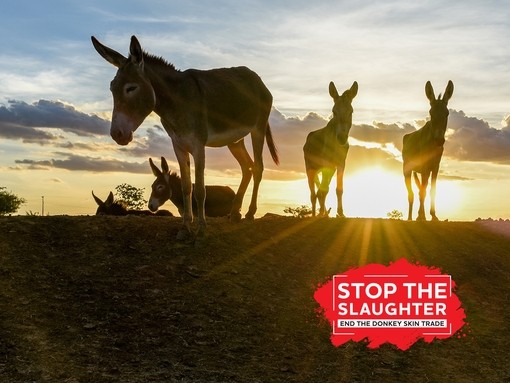
Campaigning to end the skin trade in Brazil
In 2018, the Regional Council of Veterinary Medicine of Bahia predicted that donkeys would become extinct in Brazil. This would not only mean the loss of a culturally significant animal but would violate federal law, which prohibits activities that lead to the extinction of a species.
What is the donkey skin trade?
Brazil’s donkey herd is one of many targeted by an opportunistic and extractive global trade in donkey skins used to produce the Traditional Chinese Medicine ejiao. The global trade has caused some local donkey populations to plummet and has placed unprecedented and relentless pressure on national herds in many countries. Brazil’s donkey population is in steep decline, reducing from 974,688 in 2011 to 376,874 in 2017.

What is the role of donkeys in the global south?
Donkeys have a unique and indispensable role in the lives of millions of people across the Global South. They enable families to access water, transport goods and earn an income. For many families in Africa, Asia and the Americas, donkeys are the key to survival.
The loss of a donkey is particularly harmful to women. Without a donkey, women are often forced to carry the burden otherwise carried by the donkey.
That is why, in February 2024, the African Union agreed to a moratorium on the slaughter of donkeys and export of their skins for at least the next 15 years.
Ending the trade in donkey skins would send a clear and resounding signal of Brazil’s support for the African Union’s efforts to protect donkeys. A ban in Brazil would also be tangible evidence of the country’s leadership of – and commitment to – the global bioeconomy.
The impact on brazil
Risks of the declining donkey population
Biosecurity risks
The movement of animals has inherent risks and the spread of a disease for which euthanasia is compulsory could prove highly damaging to Brazil’s lucrative horse industry, which contributes approximately R$16 billion to the economy every year.[i],[ii]
The death of tens of thousands of donkeys across West Africa in 2019[iii] demonstrated the devastation that can be caused by the spread of disease. This was largely attributed to equids being transported along routes commonly used for the donkey skin trade.
In Brazil, donkeys sold into the skin trade are captured and purchased from multiple locations before being mixed and transported long distances, often across state borders and without documentation. This poses an unacceptable biosecurity risk within Brazil as well as a risk to the country’s strong reputation as an agribusiness leader.
Compromising Brazil’s agribusiness
Donkeys play a crucial role in supporting small-scale farmers and rural communities in Brazil, providing transportation of agricultural products and helping with labour. The uncontrolled slaughter of donkeys for their skins deprives these communities of valuable working animals, reducing agricultural productivity and harming rural economies that depend on donkey labour.
To this end, several leaders in the agricultural production sector, including the equine industry, the animal protein sector, universities and professional councils of veterinary medicine and animal husbandry have expressed support for ending the slaughter and trade of donkey skins, understanding that, in the risk-benefit analysis, there is no significant gain for the national economy. On the other hand, the trade involves risks that could cause serious harm to agribusiness and public health.
Loss of unique heritage
Brazilian donkeys are recognised as a unique genetic resource.[iv] Scientists from around the world have mapped the family tree of donkeys and demonstrated unequivocally the importance of preserving the genetic heritage of these species across the globe.[v]
We are crossing a delicate point of no return in relation to the loss of biodiversity[vi] and must take urgent steps to mitigate the decline in species.

References
References
[i] ESALQ-USP. Luiz de Queiroz School of Agriculture, ‘Review of the study of the complex horse agribusiness’, University of São Paulo. Available from Review of the study of the complex horse agribusiness.
[ii] Ministry of Agriculture, Livestock and Food Supply 2016, ‘Review of the study of the horse agribusiness complex’. Available from Review of the study of the horse agribusiness complex.
[iii] The Donkey Sanctuary 2019, Under the Skin: Update on the global crisis for donkeys and the people who depend on them (PDF, 5.58 MB).
[iv] Alves, J, Oliveira, C, Escodro, P, Pinto, L, Costa, R & Camargo, G 2022, ‘Genetic origin of donkeys in Brazil’, Tropical Animal Health and Production’, 54(5), p. 291
[v] Todd, E et al. 2022, ‘The genomic history and global expansion of domestic donkeys’, Science, 377(6611), pp. 1172-1180, doi.org/10.1126/science.abo3503
[vi] Steffan, W et al. 2015, ‘Planetary boundaries: guiding human development on a changing planet’, Science. 347(6223), doi: 10.1126/science
Share this page
Tags
- News

